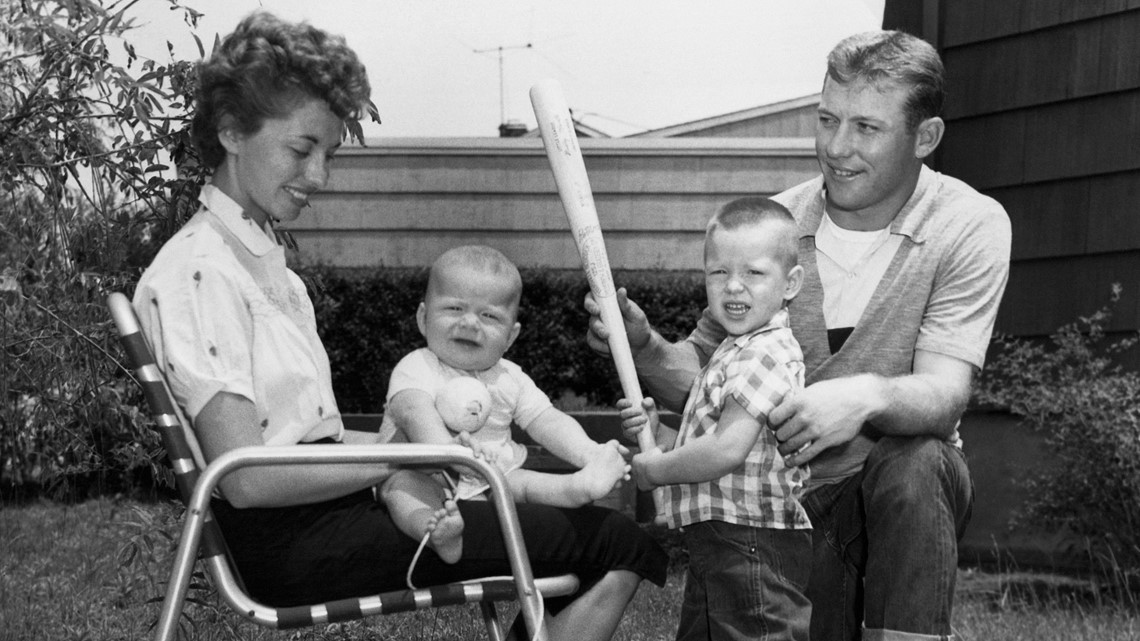'A record-breaker just like he was': Mickey Mantle's son marvels at his dad's $10M baseball card
Mickey Mantle's 1952 Topps baseball card could fetch $10 million - or more - at auction this month. His son has a good idea what his dad would say.
Courtesy of David Mantle
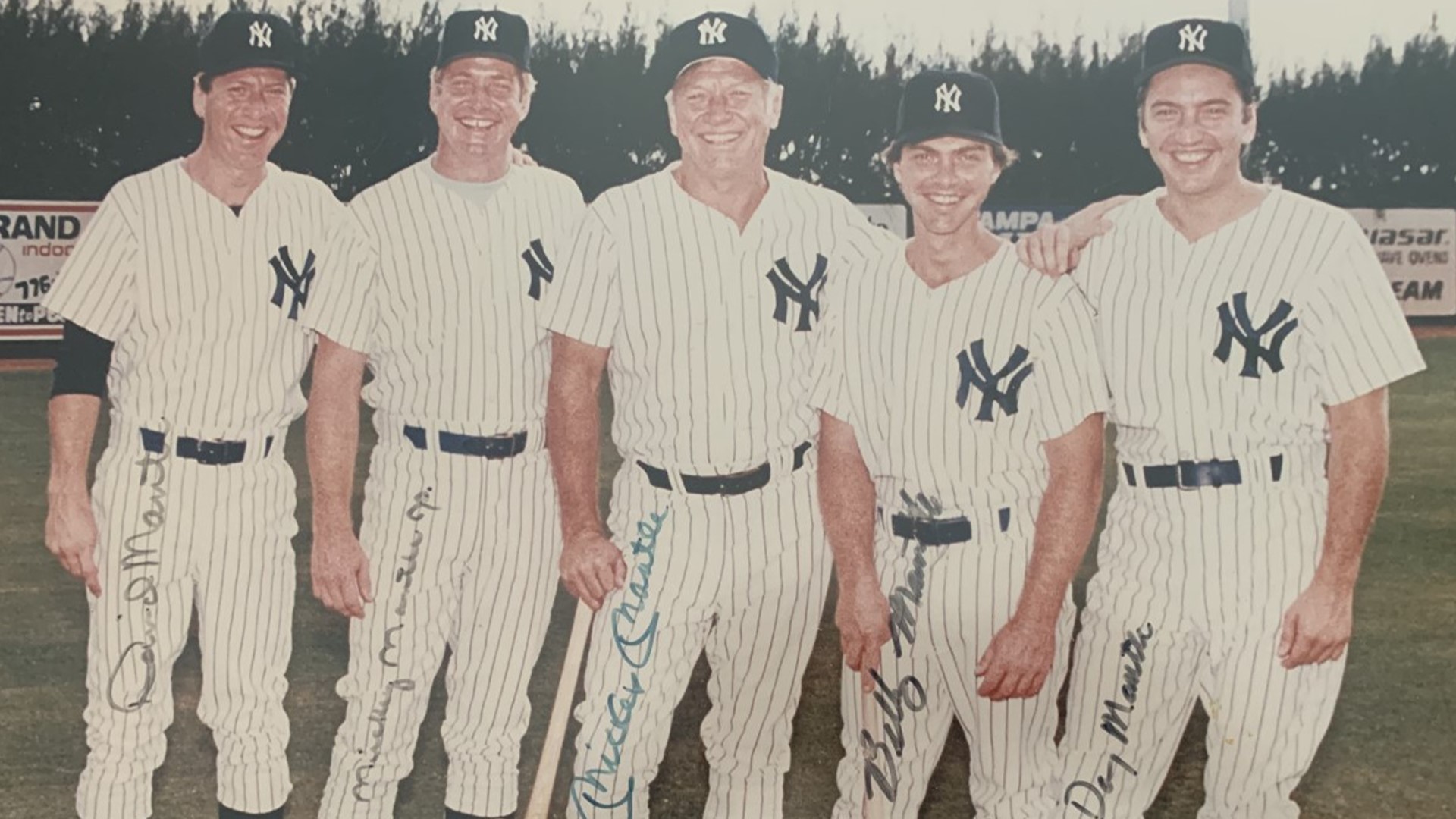
Last month, Dallas-based Heritage Auctions jolted the world of sports memorabilia with a new listing.
The item was one thing; the projected sale price was another: Mickey Mantle's 1952 Topps baseball card in near-perfect condition, graded 9.5 out of 10 by the authentication company SGC.
The estimated value: $10 million.
At a country home in North Texas, a 66-year-old man marveled at the price, not that he viewed it as a surprise.
"I'm kind of like Dad," David Mantle said. "He never understood it. We don't understand it. It makes us proud. I know it's just a card. But it still resembles Dad's career to me."
David Mantle, the legendary ballplayer's oldest living son who now lives in Van Alstyne, has never owned his dad's famed 1952 card. Neither has anyone else in the Mantle family, and Mickey, a longtime Dallas resident until his death in 1995, never had a copy, either.
David had a chance to buy the card in the 1980s, when a dealer in Florida offered him one, in decent condition, for $5,000. He didn't have the money, and he didn't feel like asking his dad for a loan. Thirty years later, he wished he had.
"It would have been nice to have one in the family," he said.

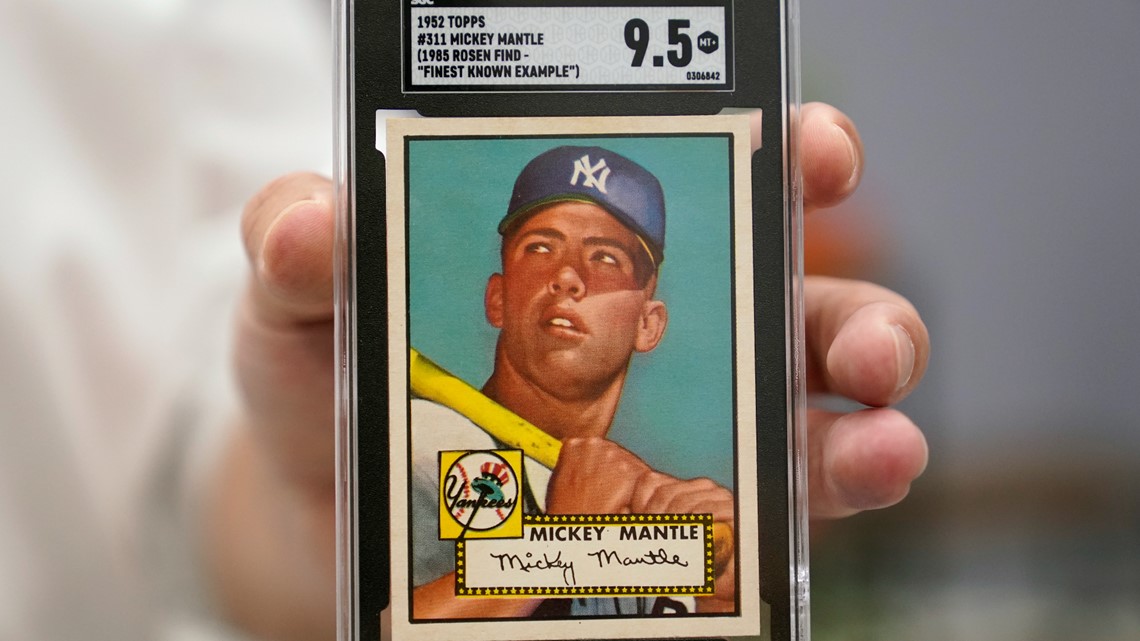
But he can't regret much.
His dad's famed '52 card – a picture of a 20-year-old Mantle, holding a golden bat over his shoulder, against the backdrop of a bright blue sky – came to represent an era of baseball in America, the game's and the Yankees' glory years of the 1950s and early 1960s.
And the Mantle family lived it: The spring trainings they vacationed in Florida; the summers they spent in The Bronx, riding with their dad to Yankee Stadium from their home in New Jersey; the ballpark Yoo-hoos they drank and the hot dogs they ate; the games of catch the played in the outfield; and the winters they spent at home in North Dallas, where Mickey's awards piled up each offseason.
Mantle, a Hall of Famer and one of the best players of his generation, retired in 1968, when David Mantle was 13.
When David sees his dad on a baseball card, he sees his childhood.
"We were lucky enough to have lived those years that those cards represent," David Mantle said. "We were very lucky."

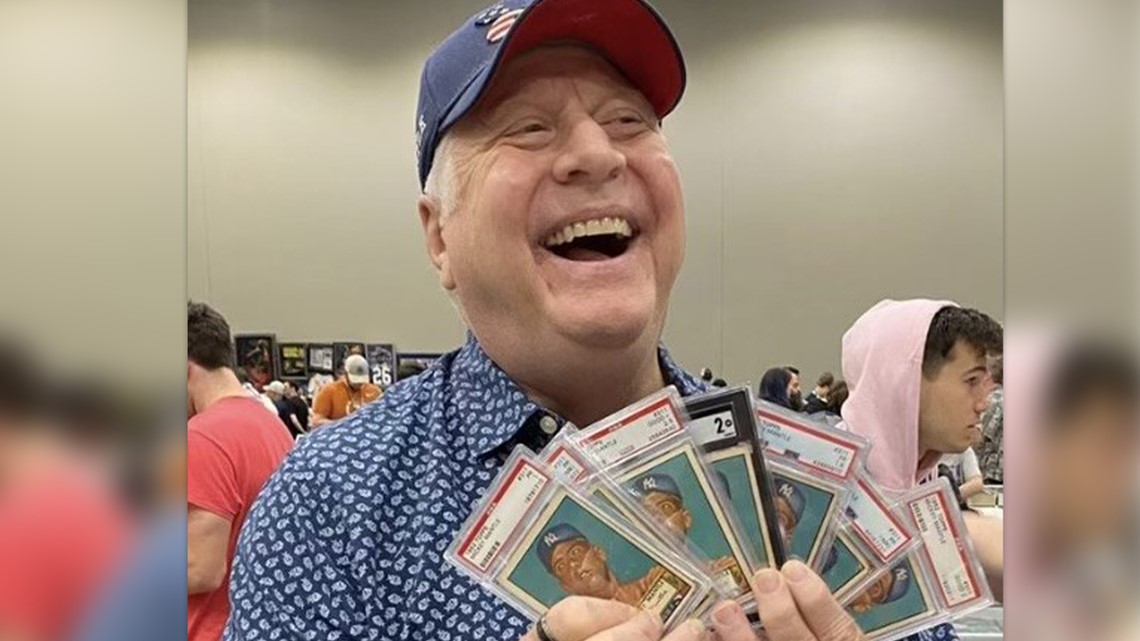
'He's worldwide'
But of all the Mantle cards, what made the '52 Topps so valuable? And why did Mantle's card become the most valuable of all?
The easy answer is that Mantle was the best player on the best team of his era, and that the '52 set, while not Mantle's true rookie, was the debut for Topps, the brand that would become the flagship for baseball cards.
The more complex reason speaks to the near-mythical devotion fans had for Mantle, whether he realized it or not, and an oddity or two about the card business.
"He's worldwide," Michael Locke, the general manager at Nick's Sports Cards in North Dallas, said of Mantle's interest among collectors. "If you go to Sweden, they buy him like crazy. They buy Dominic Hasek and Mickey Mantle."
In 18 seasons with the Yankees, Mantle hit 536 home runs, collected three American League Most Valuable Player awards, earned 16 all-star selections, won seven World Series rings and accomplished the elusive Triple Crown, in 1956, when he led the AL in homers (52), RBI (130) and batting average (.353).
But Mantle's legacy was more than a heap of stats and broken records.
Ten players have won as many or more MVP awards; seventeen have blasted more home runs; 55 have batted in more runs; 122 have collected more hits.
To fans of a certain age, Mantle became something of a myth, a baseball god who descended to the glitzy stage of New York City. His backstory helped, and to the New York fans, it read like something out of a book.
Mantle grew up in tiny Commerce, Okla., northeast of Tulsa, where his dad, Mutt, worked the zinc and lead mines and taught Mickey to switch-hit. Mickey signed with the Yankees out of high school, before he turned 18, and rose through the minors.
By his 20th birthday, he had played nearly a full season in the majors, winning a title with the Yankees in Joe DiMaggio's final season.
The Yankees won the World Series again in 1952, 1953, 1956, 1958, 1961 and 1962. Mantle won his first MVP in 1956, when he blasted 52 homers, the most for a Yankee since Babe Ruth. He won MVP again in 1957, and then a third time in 1962.

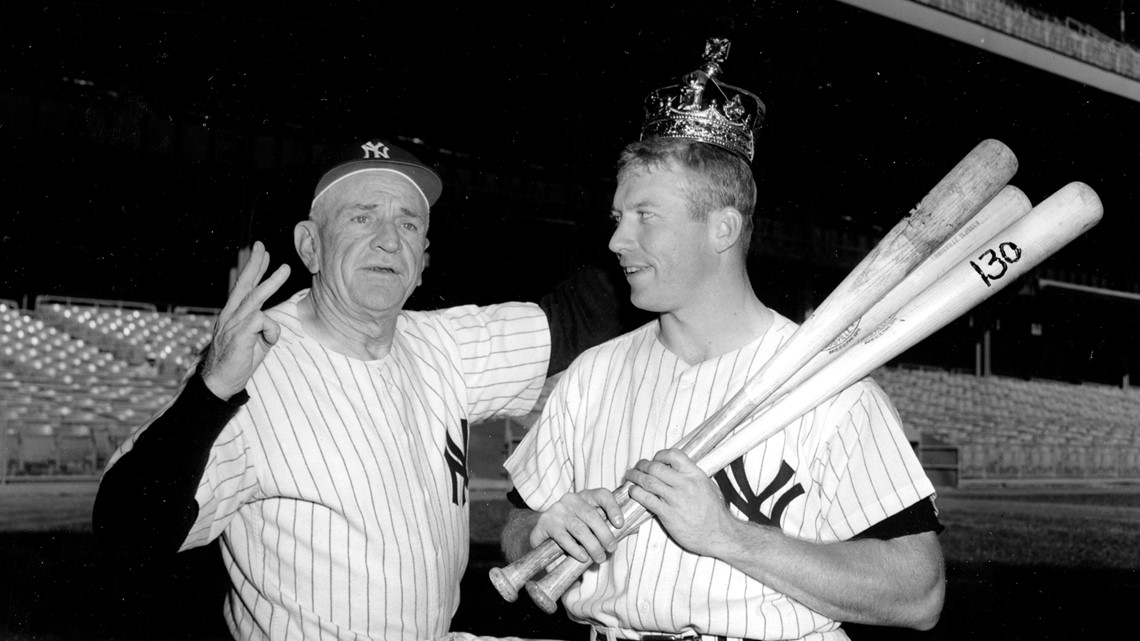
And Mantle did it while battling chronic leg injuries.
"It probably didn't help Dad to play injured," David said. "But he still did it for 17 years. And a lot of people named their kids Mickey. I have my hair standing up on the back of my neck now thinking about it."
In one of Mantle's final interviews before he died, he sat down with the baseball broadcaster Bob Costas.
Costas, who was born in 1952, was one of those wide-eyed boys who grew up in awe of Mantle. But for much of the interview, Costas pressed Mantle – about his drinking, about his shortcomings as a father and a husband, about the perpetual "sadness about you."
Mantle, who had recently gone to rehab and gotten sober, didn't push back. He embraced it, a final coming-clean.
Then Costas pivoted. He began to explain to Mantle the impact he had on kids of that era.
"You're the guy who stood in the shadows of the monuments at Yankees Stadium," Costas said. "You're the guy who hit the ball into the upper deck. You're the guy who people still have a feeling for. Not people who want to buy and sell your autograph. Rational people. When they hear your name and they see the film clips of you playing, it moves them in some way. It takes them back to a time. Maybe they can't fully explain it, but you mean something to them."
Mantle seemed caught off guard by the gravity of what Costas had just told him.
"Well," he replied, "they mean something to me, too."
Mantle retired from baseball in 1968, at 36. He was an undisputed Hall of Famer.
And his famed '52 baseball card, the one eventually destined for a $10 million price tag this month, was sitting in an attic in Massachusetts.
A treasured find
The full story behind the Mantle card being auctioned this month is a story of its own. And the grading company PSA outlined that tale in a 2013 piece in their monthly magazine.
In the end, it came down to this: Alan Rosen, a New Jersey card dealer, got a tip about a man who had a stash of 1952 Topps cards in his attic at his home south of Boston. The 1952 Topps were valued for their rarity; they were the first Topps baseball set, and a good chunk of them, according to legend, had been dumped into the Hudson River when Topps couldn't sell them.
Rosen, skeptical but curious, checked it out.
Sure enough, the man, Ted Lodge, had more than a stash. He had 5,500 cards, many of them from the iconic 1952 set, including several dozen Mantles in good condition.
Rosen paid $125,000 for the haul and began selling them off, one by one.
A "sharp" Mantle initially sold for around $3,000, according to PSA, and then $3,500.
A set of 10 Mantles that were "off-centered" – meaning the picture was either too far left or too far right on the border – sold for $10,000 total.
In all, Rosen made about $475,000 off the cards he bought from Lodge in Massachusetts.
His biggest sale came in 1991, when an anonymous buyer purchased what Rosen called the "finest known example in the world" of a Mantle 1952 card.
Rosen and buyer settled on $50,000, $500 more than the previous record for a sports card, according to Heritage Auctions.
For decades, the buyer stayed anonymous, as the 1952 Mantle only soared in value.
Last year, for example, a card graded a 9 by PSA sold for $5.2 million.
Then, earlier this year, Heritage received the card that was purchased from Rosen, the one that was initially stored away in the attic in Massachusetts. The seller, Anthony Giordano, decided it was time to put the card up for auction.
When he got the card graded by SGC, it came back as a 9.5 out of 10. Only three Mantle card exist with a higher grade – all a 10 from PSA – and none are for sale.
Chris Ivy, the director of sports auctions at Heritage, described why he expected Giordano's Mantle card to sell for more than $10 million: "It bears the finest qualities any 1952 Topps can possess: perfect centering, registration and four sharp corners. If you were to put this card in a lineup with the other known examples graded 9 or 10 and covered the labels, this would stand out as a clearly superior specimen. That this Mantle rookie card remained in this condition for 70 years is a true miracle."

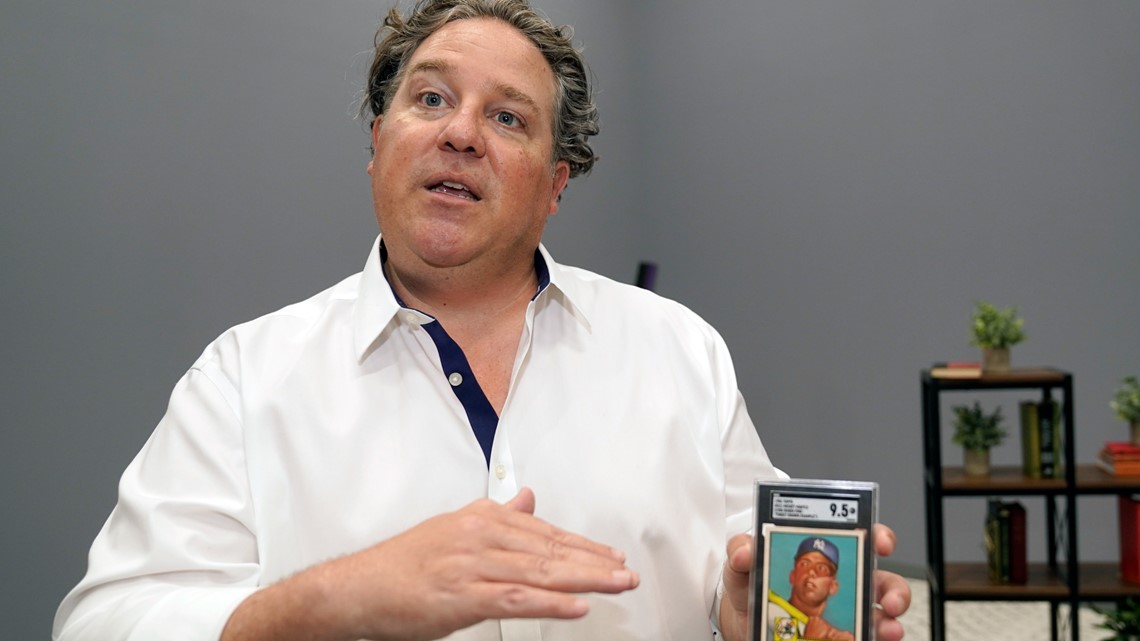
'Another record-breaker'
Locke, the manager at Nick's Sports Cards in Dallas, also predicted the final sale to eclipse $10 million - easily.
Locke compared the card to a piece of rare art that will draw bidding from the uber-wealthy. He said a few of his customers have tossed around the idea of placing a bid on the card.
"And you know by what they spend in here every week that they're legit," Locke said.
With 10 days left on the auction, the bidding was up to $6.5 million on Thursday.
What would Mickey think of the bidding war?
David pictured his dad in Heaven, alongside his old teammates Billy Martin and Whitey Ford.
"I bet he's up there talking with Billy and Whitey," David joked, "saying can you believe this s---?"
In reality, Mickey knew before he died how coveted his cards and autographs had become. Him and his sons toured the country in the 1980s, when card shows boomed in popularity. At the same time, the shy Mantle, his son said, "kind of felt embarrassed" by people spending top dollar for his memorabilia.
He also wouldn't mind anyone making a nice profit.
"God bless 'em," David Mantle imagined his dad saying. "If they could get that much money, go for it."
David Mantle said he won't be surprised by the final sale price, even if the number is stunningly high. And he's sure it will be.
"It's going to be another record breaker," David Mantle said. "Just like he was."

